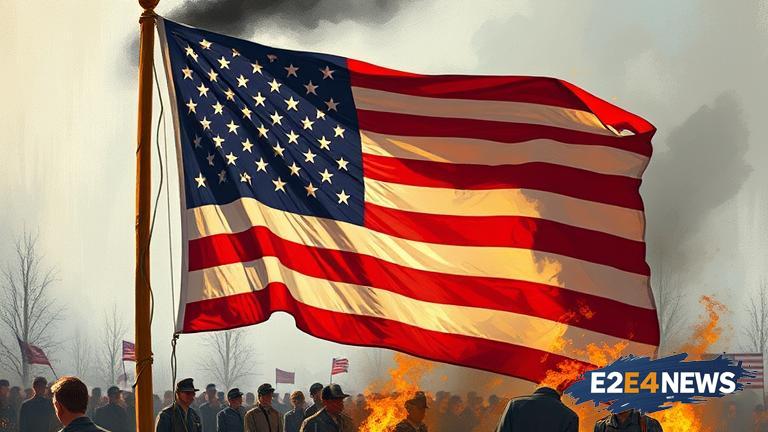The proposal, which was announced on social media, has been met with widespread criticism from civil liberties groups and legal experts, who argue that it would be a clear violation of the First Amendment. The First Amendment, which guarantees freedom of speech and expression, has been interpreted by the Supreme Court to protect acts of flag burning as a form of symbolic speech. In the 1989 case of Texas v. Johnson, the court ruled that flag burning was a protected form of expression, sparking a national debate on the issue. Trump’s proposal has been seen as a attempt to reignite this debate and appeal to his conservative base. However, many have pointed out that such a ban would be difficult to enforce and could lead to unintended consequences, such as the suppression of peaceful protest and the erosion of civil liberties. The American Civil Liberties Union (ACLU) has condemned the proposal, stating that it would be a ‘blatant attack on the First Amendment’. The organization has also pointed out that flag burning is a rare occurrence and that the proposal is a ‘solution in search of a problem’. Other critics have argued that the proposal is a distraction from more pressing issues, such as healthcare and economic inequality. The debate has also sparked a wider discussion on the meaning of patriotism and the role of symbols in American culture. Some have argued that flag burning is a form of disrespect to the country and its values, while others see it as a legitimate form of protest and a necessary check on government power. The issue has also been complicated by the fact that many veterans and military families have spoken out against the proposal, arguing that it would be a betrayal of the values of freedom and sacrifice that they fought to protect. Despite the criticism, Trump has remained defiant, tweeting that ‘our great flag’ deserves to be protected and that those who burn it should face ‘consequences’. The proposal has also been seen as a attempt to shift the focus away from the president’s own controversies, including his response to the COVID-19 pandemic and his handling of racial tensions. However, the move is unlikely to succeed, with many predicting that it will ultimately be struck down by the courts. The Supreme Court has consistently ruled in favor of free speech and against attempts to restrict it, and it is likely that this proposal will be no exception. In the meantime, the debate is likely to continue, with many Americans weighing in on the issue and arguing for or against the proposal. As the country grapples with the complexities of free speech and patriotism, one thing is clear: the proposal has sparked a necessary and important conversation about the values and principles that America represents. The issue has also highlighted the deep divisions in American society, with many on both sides of the debate holding strongly opposing views. Ultimately, the proposal is a reminder that the First Amendment is a fundamental right that must be protected and defended, even when it is difficult or unpopular. The country will be watching closely as the debate unfolds, and the outcome will have significant implications for the future of free speech and American democracy.
